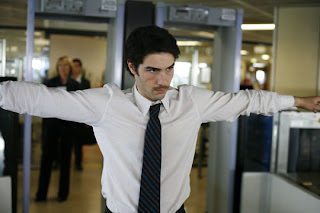A Prophet

Jacques Audiard loves criminals; at least that's just about all he seems to make his movies about. But there is rarely some lesson to be learned from their crimes, nor is there much repentance in the end. Audiard seems to view them as any modern man struggling with notions of loyalty and dealing with the consequences of seizing an opportunity. Like any anti-hero, our criminal is more tough than he is strong. We can just as easily see him picking a fight as we can see him getting the shit beat out of him. He is the everyman, one whose eyes we can all see these wonderful little worlds through. But why criminals? Why not businessmen? Police officers? Teachers? Students? Is it simply because of the excitement that comes with the risk? Is it because businessmen rarely lose their limbs or their lives if they can't seal the deal?
His latest offering, 'A Prophet', takes us into one of these unholy consequences - prison. The movie opens as young Malik is checked in. He seems a lifelong criminal, one without family or the ability to read or write. That's all we can tell about him. He's really like most other young men in prison, the perfect Audiard muse. But, by happenstance, he is quickly forced to murder a man on behalf of the Corsican mafia he's had nothing to do with. After which, he is under the protection of Cesar Luciani (played by the fantastic French actor Niels Arestrup) and his small band of Corsicans who not so quietly reign over the prison. Thus begins his rather dubious rise to power. For all the ways life becomes easier for him, he is merely an errand boy for Cesar; one who could not escape his clutches if he tried. Even his day passes of freedom, which are only made possible by Cesar's connections, are completely filled with tasks to be carried out on his behalf. As the film stretches out beyond the prison, 'A Prophet' reveals itself more as a gangster film than a prison one - prison is just another neighborhood different gangs circle around each other in.
Like another gangster film, 'Goodfellas', our hero eventually goes behind his father figure's back to dabble in the lucrative world of drugs. And very much like 'Goodfellas', the filmmaker seems to have no rules. His style seems to shift at any given moment. There are occasional titles giving time served and characters' names. Malik is occasionally visited by the burning ghost of the arab he killed to earn his protection. In a breathless kidnapping sequence, all sound disappears as Malik's ears succumb to the cacophony of gunfire. Slow motion occasionally brings things to a wonderful standstill. Anything goes in Audiard-land. It's an anti-style style, and it serves this journey through time well.


0 Comments:
Post a Comment
Subscribe to Post Comments [Atom]
<< Home